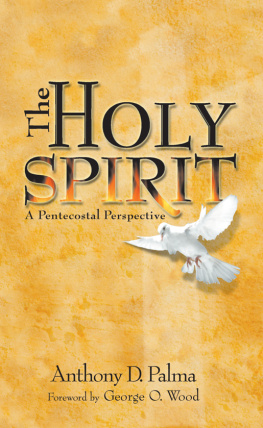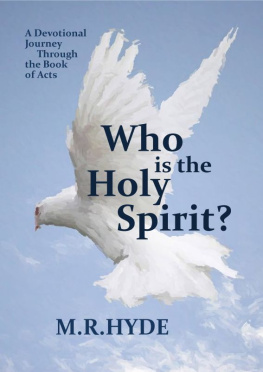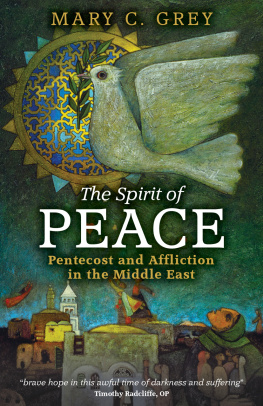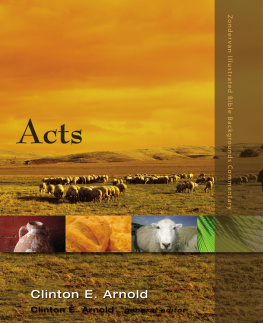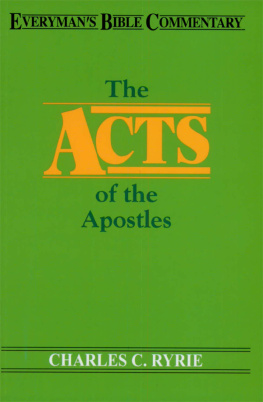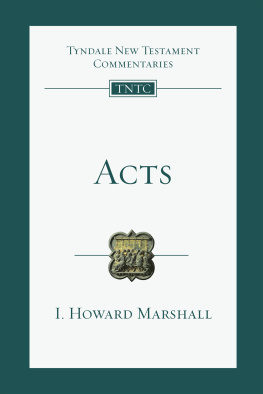The HOLY SPIRIT
A Pentecostal Perspective
Anthony D. Palma
Foreword by George O. Wood

Gospel Publishing House
Springfield, Missouri
All Scripture quotations, unless otherwise indicated, are taken from the HOLY BIBLE: NEW INTERNATIONAL VERSION; NIV. Copyright 1973, 1978, 1984 by International Bible Society. Used by permission of Zondervan Publishing House. All rights reserved.
Scripture quotations marked (NASB) are taken from the New American Standard Bible, Copyright 1960, 1962, 1963, 1968, 1971, 1972, 1973, 1975, 1977, 1995 by The Lockman Foundation. Used by permission. (www.Lockman.org)
2001 by Gospel Publishing House, Springfield, Missouri 65802-1894. All rights reserved. No part of this book may be reproduced, stored in a retrieval system, or transmitted in any form or by any meanselectronic, mechanical, photocopy, recording, or otherwisewithout prior written permission of the copyright owner, except brief quotations used in connection with reviews in magazines or newspapers.
Logion Press books are published by Gospel Publishing House.
Library of Congress Cataloging-in-Publication Data
Contents
Several years ago an older believer told me about the first memory she had of me: I was six years old. She had made her way back to her pew after an intense time of prayer at the altar. With all the wisdom that a little boy raised in a Pentecostal preachers home could muster I asked her this very adult question, Well, Sister, are you satisfied with your experience?
As Pentecostals, our emphasis on having a personal experience with the Holy Spirit has sometimes brought us into a great deal of criticism from other members in the Christian family. Many have perceived us as basing reality upon the subjectivity of our own experience rather than upon the objectivity of Gods Word.
Sometimes our critics have forgotten that even the people of the Bible had great experiences in God before they were able to articulate a theology placing their experience within the greater context of Gods revelation. Moses met God at a burning bush before God taught him the lessons of the Pentateuch. Isaiah experienced God in the temple long before he understood the panorama of history and prophecy God would later reveal to him. Saul of Tarsus encountered Jesus on the Damascus Road well before he could have passed an examination on the relationship of law to grace.
I say all this because you have before you a superb, systematic, and thoughtful biblical theology of the Holy Spirit, written by one of our preeminent scholars, Dr. Anthony D. Palma.
There are two things you should keep in mind as you study his work.
First, if you have already had a powerful experience or experiences in the Holy Spirit, this work will put a biblical floor underneath your feet. It will provide you with a thorough understanding of the person and work of the Holy Spirit, as revealed throughout the Scriptureour totally trustworthy source for truth. A great Pentecostal leader of another generation, Thomas F. Zimmerman, remarked that the relationship of the Spirit to Scripture is like a river to its banks. The Holy Spirit, he said, is the river, but the Spirit will only flow within the banks of Scripture. This book will help you know those banks, better enabling you to walk in the Spirit.
Second, if you have not already encountered the person of the Spirit through conversion, baptism in the Spirit, exercise of spiritual gifts and fruitthis book cannot substitute for such experience. Dr. Palmas desire is to help you know the Spirit, but an intellectual apprehension of what the Bible teaches about the Holy Spirit can never replace your own personal experience with Him. May this wonderfully helpful textbook on the Spirit only whet your appetite for His presence and power in your own life.
Finally, a word about Pentecostal scholars. We owe a great debt to people like Dr. Palma who have dedicated their entire lifetime to understanding and teaching Gods Word. I have known Dr. Palma and his wife, Betty, for many years. They are single-minded people, with a great love for the Lord, gentle dispositions, sacrificial and plain lifestyles, a deep care for students, and a passion that the Church today be a mirror image of the Church in the New Testamentfull of the Holy Spirit and power.
George O. Wood
General Secretary
The General Council of the Assemblies of God
This study of the Holy Spirit is an outgrowth of several things: numerous articles I have written on various aspects of the Spirits ministry; a monograph titled The SpiritGod in Action, which was used throughout the Assemblies of God in the mid-1970s as a training course for Sunday school workers; three theses I wrote for my graduate degrees in theology; notes for classes I have taught at the undergraduate and graduate levels; and extensive research for the past several years. The three theses are titled: Glossolalia in the Light of the New Testament and Subsequent History (S.T.B./M.Div); Tongues and ProphecyA Comparative Study in Charismata (S.T.M.); and The Holy Spirit in the Corporate Life of the Pauline Congregation (Th.D.).
In line with the usage of both the KJV and the NIV, Lord is used in capitals and small capitals where the Hebrew of the Old Testament has the personal, divine name of God, Yahweh (which was probably pronounced ya-w ).
In quoted Scripture, words the author wishes to emphasize are in italics.
For easier reading, Hebrew, Aramaic, and Greek words are all transliterated with English letters.
These abbreviations have been used:
KJV: King James Version
NASB: New American Standard Bible
NIV: New International Version
NKJV: New King James Version
NRSV: New Revised Standard Version
BAGD: Bauer, Arndt, Gingrich, and Danker, A Greek-English Lexicon of the New Testament and Other Early Christian Literature
BDF: Blass, Debrunner, and Funk, A Greek Grammar of the New Testament and Other Early Christian Literature
TDNT: Kittel, Theological Dictionary of the New Testament
STANLEY M. HORTON
GENERAL EDITOR
This book is a study of the Holy Spirit from a Pentecostal perspective. It does not speak for all Pentecostals, but I believe it represents the thinking of classical Pentecostals and many charismatics in its main theses.
What does the Scripture say? () has been my motto from my mid-teens when, as a Roman Catholic, I began to study the Scriptures and, as a result, decided to leave the Roman Catholic Church. The Reformation watchword of sola Scriptura (Scripture alone) has guided virtually all I have written in this book. I have chosen to delimit the books scope chiefly to an investigation of Scripture. Matters related to ongoing church history and to some contemporary extrabiblical phenomena, important as they are, would detract from the books primary purpose.
Because of the books perspective, the reader will understand why I have given a disproportionate amount of space to matters dealing with Pentecostal theology. But it is not because those matters are more important than others, except for the intent of this book.
Part 1 is a general treatment of matters about the Holy Spirit on which there is little disagreement among theologically conservative Christians. By design, therefore, the style and documentation are less interactive than one finds in the rest of the book.
Part 2 deals with the much-debated Pentecostal teaching on baptism in the Holy Spirit. I have tried to complement the traditional Pentecostal apologetic with insights I have gained from personal study and from colleagues. I readily admit that complete objectivity by me is virtually impossible. But I am hopeful that the readers will make a similar admission about themselves and maintain an openness of mind and spirit.

